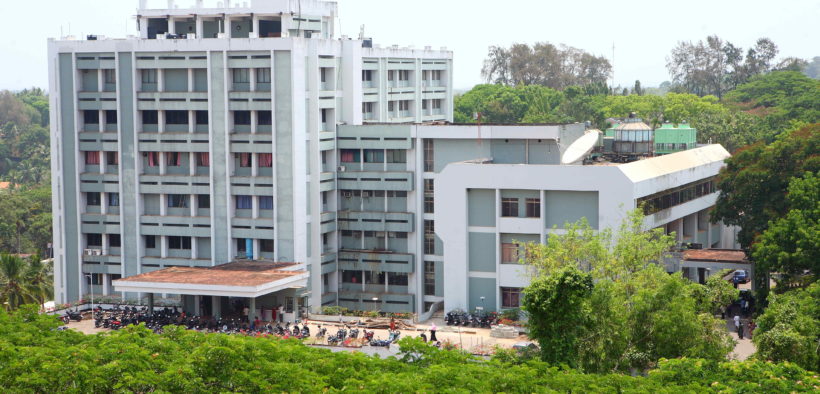Battling Cancer For Decades

The Regional Cancer Centre in Thiruvananthapuram has been at the forefront of the cancer control programme in India
By Aatika H Jain
In 1975, with cancer becoming an increasingly grave public health concern, India launched the National Cancer Control Programme (NCCP) through its Ministry of Health and Welfare. The programme focuses on reducing cancer morbidity and mortality by primary prevention through education and secondary prevention through early detection, improving the cancer care infrastructure in the country and providing palliative care for the terminally ill. Since its inception, NCCP has successfully established 28 cancer centers throughout the country.
The Vanguard
In 1981, the Regional Cancer Centre, Thiruvananthapuram, was established as a collaborative effort by the government of Kerala and the Centre to cater for the population of Kerala and the neighboring states of Tamil Nadu and Karnataka. Set up as a state-owned cancer hospital and research center, RCC was designed to develop into a center of excellence with enhanced teaching and research facilities.
The center has grown from being just an expansion of the Radiotherapy Department of the Thiruvananthapuram Medical College to an autonomous, comprehensive tertiary cancer care center for all kinds of cancers. RCC offers state-of-the-art services in cancer diagnosis, treatment, palliative care, and rehabilitation. It also engages in cutting-edge cancer research programs, basic as well as clinical. This has led to the successful translation of the results of basic research to clinical settings as well as insights gathered from clinical applications to provide new fields for basic research. It also offers postgraduate, doctoral and postdoctoral training courses to groom the next generation of healthcare professionals and scientists for leading the industry in basic and clinical research. RCC organizes awareness programmes through the media, outreach camps and classes for cancer education and prevention.

Road To Glory
Since its inception, RCC has consistently grown from one milestone to another. The first community oncology division in India was founded here in 1985 to support early cancer detection. In 1990, the state declared RCC as a Centre of Excellence in Science and Technology field. Five years later, it became a WHO Collaborating Centre for Cancer Control for Developing Countries. The year 2003 witnessed the setting up of Onconet, a telemedicine network that connects peripheral centers including Kochi, Palakkad, Karunagappally, and Kannur. “The Centre has been elevated to the status of State Cancer Institute by the central government in 2014, as a recognition of its capabilities in providing state-of-the-art diagnostic and treatment facilities. This re-designation will be a catalyst to strengthen the departmental infrastructure and hence, the institutional facelift. The new status, we hope, will be a stepping stone to becoming a National Cancer Institute,” says Dr. Paul Sebastian, former Director, RCC. In the same year, RCC also received the coveted NABH accreditation. “We have acquired NABH accreditation after passing through a set of quality norms that have been tested for the past several years. With this, the Centre becomes the first government-owned cancer treatment institution in the country to win the coveted NABH tag for quality and safety. It has improved treatment standards, patient amenities and safety and documentation of services and facilities,” says Dr. Sebastian.
RCC is a member of multi-disciplinary tumor boards (MDTs), consisting of medical oncologists, radiation oncologists, surgical oncologists and onco-pathologists for the management of cancers. The center has pioneered policies to provide cancer care to the underprivileged by offering free chemotherapy, and advanced cancer diagnostic services. Almost 53 percent of patients receive free treatment, and another 27 percent in the middle-income group is treated at subsidized rates. Children receive free chemotherapy. RCC services over 17,000 new cancer cases, 50,000+ follow-up visits of old cases and around 80,000 non-cancer patients for investigations every year. During the last five years, there was a 50 percent increase in the registration of both cancer and non-cancer cases. Free medicines worth INR 80 lakh have been disbursed to the socioeconomically weak in the past five years. “The Centre manages about one-third of all cancer cases reported in Kerala,” explains Dr. Sebastian. “Managing patient flow posed a real challenge, but we strove hard to ensure that all patients had access to quality cancer care. Proper guidance is given to needy patients to avail funds from government-sponsored schemes. We have also ensured hassle-free treatment for beneficiaries of various patient welfare schemes. This has helped 13,057 new patients to avail treatment worth INR 32.23 crore through schemes such as Cancer Suraksha, CHIS Plus, Karunya Benevolent Fund, Sukrutham, Thalolam, Scheduled Tribe Patient Fund, Snehasanthwanam for Endosulfan Victims, Prime Minister’s Relief Fund and Rashtriya Arogya Nidhi in the year 2014-15.”
















